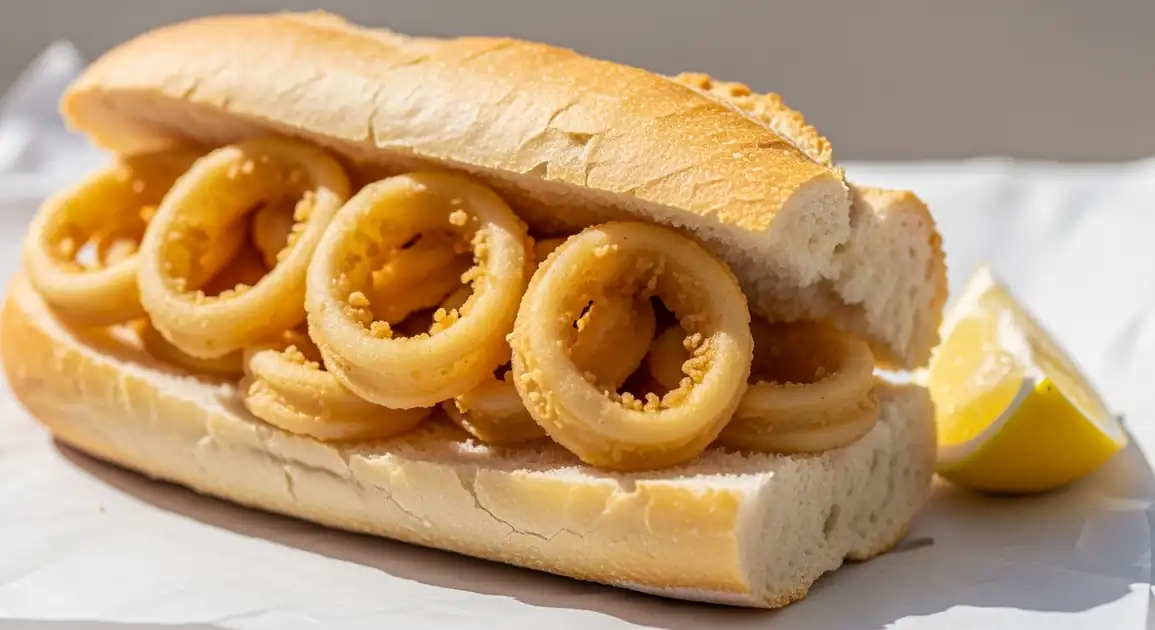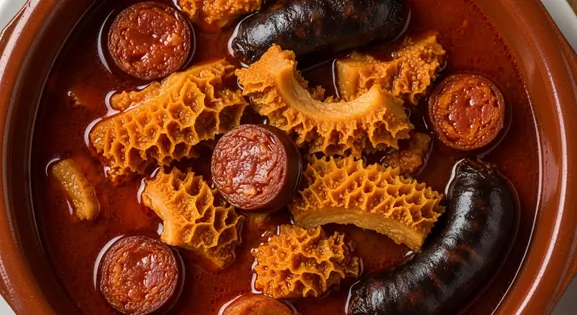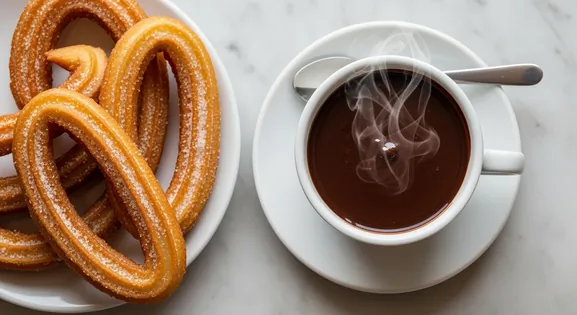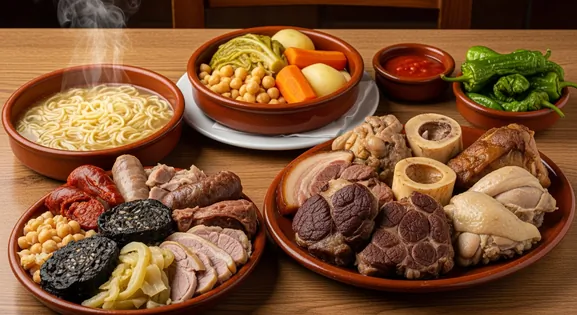Bocadillo de Calamares (Fried Squid Sandwich) in Madrid
Bocadillo de Calamares

Bocadillo de Calamares (Fried Squid Sandwich): A Local Culinary Staple
Stepping into Madrid, one of the first culinary quests is the legendary Bocadillo de Calamares. This simple yet satisfying sandwich, featuring perfectly fried squid in crusty bread, is more than just food—it's a true taste of Madrileño life, best enjoyed standing at a bustling bar near Plaza Mayor.
New to Bocadillo de Calamares (Fried Squid Sandwich)? Learn all about its history in our complete guide.
Pro Tips for an Authentic Experience
Many traditional bars serve excellent bocadillos during the pre-lunch vermouth hour (around 1 PM), often less crowded than peak lunch.
While Plaza Mayor has famous spots, venture into the immediate side streets like Calle Botoneras for equally authentic and sometimes less touristy options.
Eating your bocadillo standing at the bar with a caña is the most authentic Madrileño experience. It's quick, social, and often where the best food is found.
Authentic vs Imitation: The Telltale Signs
What to Look For
-
Calamari rings fried fresh to order – listen for the sizzle!
Essential for crispiness and safety. Best bars around Plaza Mayor fry constantly due to high demand.
-
Golden, crispy coating; not pale or dark brown.
This color indicates the calamari was fried at the correct temperature in clean oil, ensuring a delicious and safe product.
-
High turnover of customers ordering the bocadillo.
A busy establishment means ingredients, especially the fresh calamari, are constantly replenished and used quickly, indicating freshness and quality.
-
Clean frying station and fresh-looking bread ('barra de pan').
Observe the cleanliness of the preparation area and ensure the bread appears fresh and crusty, as these are strong indicators of overall hygiene and quality.
What to avoid
-
Pre-fried calamari rings sitting in a pile under heat lamps.
Will be tough, greasy, and a potential food safety risk. Common in less reputable spots trying to serve tourists quickly.
-
Very dark, almost burnt calamari or overly greasy bread.
This indicates that the frying oil is likely old, dirty, or not at the correct temperature, which negatively impacts both taste and quality.
-
Strong 'fishy' or ammonia smell from the calamari.
A pungent, overly fishy or ammonia-like odor is a clear sign that the squid is not fresh and should be avoided for your safety.
-
Stale, hard, or soggy bread.
The bread is crucial for a good bocadillo. If it's not fresh and crusty, it will significantly detract from the overall enjoyment of the sandwich.
The Art of Ordering
To order like a local, simply ask for "Un bocadillo de calamares, por favor." While some places offer mayonnaise, the traditional Madrileño way is to enjoy it plain or with just a squeeze of fresh lemon. Don't be surprised if you pay after eating, especially in busy bars. Pair it with a small draft beer, a "caña," for the quintessential experience. Embrace the bustling atmosphere and enjoy your sandwich standing at the bar.
Navigating the City for Great Bocadillo de Calamares (Fried Squid Sandwich)
Plaza Mayor Area
This historic square is the heart of Madrid's bocadillo de calamares tradition, home to numerous classic bars that have perfected this iconic sandwich over decades, offering a bustling, authentic experience.
Bar La Campana, Bar Postas, Plaza Mayor
Lunch (1 PM - 3 PM), Evening (7 PM - 10 PM)
Atocha/Recoletos
This district, particularly around the main train station, is renowned for housing Bar El Brillante, a legendary spot famous for its generously sized and consistently delicious calamari sandwiches, attracting both locals and travelers.
Atocha Station, Bar El Brillante
All day, Late night (after 11 PM)
La Latina
Known for its vibrant tapas scene and traditional charm, La Latina offers numerous authentic bars where you can find high-quality bocadillos de calamares, often enjoyed as part of a lively Sunday afternoon stroll.
Calle Cava Baja, Mercado de la Cebada
Sunday afternoon, Lunch (1 PM - 3 PM)
Mercado de San Miguel
While a more modern and upscale setting, this iconic gourmet market features select stalls that offer refined versions of the bocadillo de calamares, perfect for a quick, high-quality bite amidst other Spanish delicacies.
Mercado de San Miguel
Afternoon (12 PM - 6 PM), Evening (6 PM - 9 PM)
Vendor Tips
- Bars with a queue of locals are usually worth the wait.
- Avoid places advertising 'tourist menus' alongside calamari sandwiches.
- Places displaying 'Especialidad de la Casa' for their calamari often take pride in their version.
- Establishments with decades of history (e.g., 'Desde 1961') typically maintain traditional quality.
A Guide to Price, Portions, and More
Dietary Information
Important Note for Travelers: Your safety is our priority. Below are the common allergens associated with the traditional preparation of this dish. However, recipes and ingredients can vary significantly between establishments. Always confirm all ingredients directly with the food vendor before ordering, especially if you have a severe allergy.
Potential Allergens
Dietary Suitability
Price Guide
Budget Tips
- Prices near Plaza Mayor and other tourist spots can reach 7-8.50 EUR.
- Traditional bars in neighborhoods like La Latina or Lavapiés offer better value (3.50-5 EUR).
- Some bars offer a 'half portion' (medio bocadillo) for less.
- Look for 'Menu del Día' that might include a calamari sandwich with drink for a set price.
- Bar El Brillante and Bar La Campana are famous but reasonably priced despite their reputation.
Serving & Seasonality
In Madrid, traditionally served on wax paper or small plates at the bar. Sometimes wrapped in paper for takeaway. Typically accompanied by lemon wedges. Best establishments serve on clean paper for each order.Best Times to Enjoy
- Lunch: Prime time to enjoy the sandwich when turnover is highest (1 PM - 3:30 PM).
- Late Evening: Popular after-theater or night out option, especially Thursday-Saturday (10 PM - 2 AM).
- Mid-Morning: Sometimes enjoyed as a hearty mid-morning snack (around 11 AM).
Seasonal Availability
Available year-round. Particularly popular during San Isidro festival (May) and Christmas season when the center of Madrid is busiest.
A Cultural Deep Dive
Local Significance
The Bocadillo de Calamares is to Madrid what the cheesesteak is to Philadelphia—a defining culinary symbol. It represents Madrid's unpretentious attitude toward good food and the city's historical relationship with bringing seafood inland.
Eating Customs
- Madrileños typically eat it standing at the bar with a caña (small beer).
- Adding just a squeeze of lemon is the authentic way; asking for extra sauces marks you as a tourist.
- In traditional bars, you might see the paper wrapper discarded on the floor—this is (or was) normal practice.
- Often ordered as a shared item among friends before continuing a tapas crawl.
Unique Preparations of Bocadillo de Calamares (Fried Squid Sandwich)
Plaza Mayor Style
The classic Madrid style: generous portion of lightly battered calamari in crusty bread, minimal additions. Bar La Campana near Plaza Mayor is the archetype.
Atocha Style
Named after the famous Bar El Brillante near Atocha Station, featuring slightly thicker batter and often served quartered with lots of lemon.
Gourmet Variants
Modern interpretations found in upscale tapas bars or Mercado de San Miguel, sometimes featuring black squid ink in the batter, artisanal bread, or house-made aioli.
Squid Ink Version
A distinctive Madrid variation where the batter or bread incorporates squid ink for a black appearance and more intense seafood flavor.
Getting the Most Out of Your Meal
Navigating Plaza Mayor for the Best Bocadillo de Calamares
Learn how to navigate the bustling area around Plaza Mayor to discover the most authentic and delicious Bocadillo de Calamares, avoiding common tourist traps.
- Venture into the side streets *immediately* surrounding Plaza Mayor, not just the bars under the arches (often pricier/lower quality).
- Look for small, standing-room-only bars packed with locals, often with simple, decades-old decor.
- Prioritize bars where you see calamari being actively fried in batches.
- Expect minimal seating; eating standing at the bar or taking it away is common.
- Be prepared for crowds, especially on weekends or lunchtimes.
How to Order Your Bocadillo de Calamares
Master the art of ordering your Bocadillo de Calamares in Madrid, ensuring you get exactly what you want and blend in with the local Madrileño crowd.
- Simply ask for 'Un bocadillo de calamares, por favor'.
- Specify if you want lemon ('con limón') or mayonnaise ('con mayonesa'), though plain or with lemon is most traditional.
- Pay when you order or receive the sandwich, depending on the bar's system (observe others).
- Pair it with a 'caña' (small draft beer) or a 'refresco' (soft drink).
- Prices are usually very reasonable (3-5 EUR range typically).
Our Commitment to Quality
At Tasteplorers, our mission is to provide the most accurate and useful travel information in the world. To achieve this, all content on this site is created through our unique editorial framework. We utilize leading AI research tools, guided by our proprietary prompts, and a multi-stage validation process. This entire system is overseen by our editorial team to ensure everything we publish meets our high standards for accuracy, cultural nuance, and practical value for travelers.
Learn more about our Editorial Process and our Mission.
Countries
Explore regions
Europe
Discover Europe's diverse culinary landscape, from Mediterranean flavors to hearty Alpine fare. Learn to navigate markets, decode menus, and eat like a local.
Latin America & Caribbean
Discover the vibrant cuisines of Latin America & the Caribbean. Our expert guide covers everything from Mexican street food to Peruvian ceviche and market tips.
Oceania
Explore Oceania's diverse food scene. Learn about Polynesian earth ovens, Fijian feasts, and the vibrant café culture of Australia and New Zealand.
Southeast Asia
Explore Southeast Asia's diverse food cultures from Thailand to Vietnam. Get expert tips on navigating spice levels, choosing quality vendors, and understanding the rich traditions of the region.


